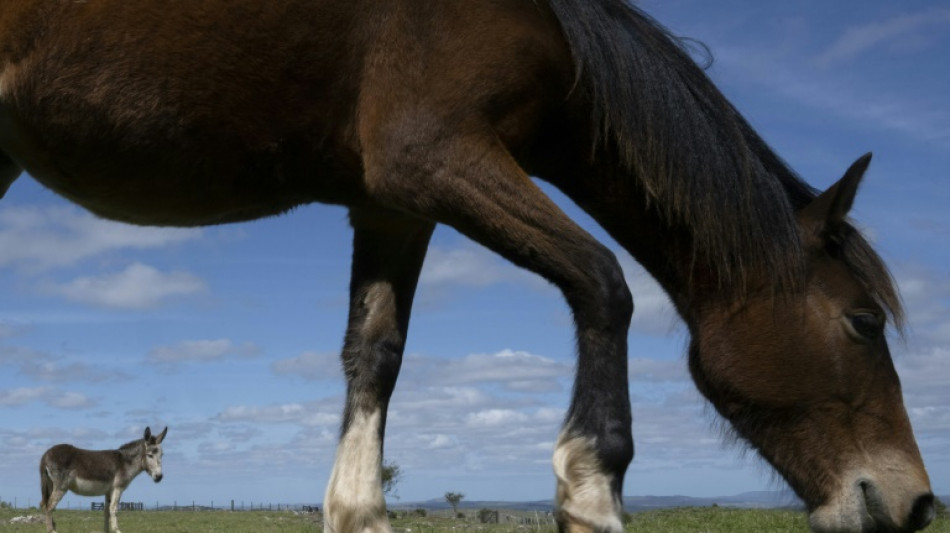
-
 Kim takes one-shot lead over Thomas, Novak at RBC Heritage
Kim takes one-shot lead over Thomas, Novak at RBC Heritage
-
Another round of anti-Trump protests hits US cities

-
 'So grateful' - Dodgers star Ohtani and wife welcome first child
'So grateful' - Dodgers star Ohtani and wife welcome first child
-
PSG maintain unbeaten Ligue 1 record, Marseille back up to second

-
 US, Iran report progress in nuclear talks, will meet again
US, Iran report progress in nuclear talks, will meet again
-
US Supreme Court intervenes to block Trump deportations

-
 Hamas armed wing says fate of US-Israeli captive unknown
Hamas armed wing says fate of US-Israeli captive unknown
-
Pacers thump Bucks to open NBA playoffs

-
 Sabalenka reaches Stuttgart semis as Ostapenko extends Swiatek mastery
Sabalenka reaches Stuttgart semis as Ostapenko extends Swiatek mastery
-
Zelensky says Ukraine will observe Putin's Easter truce but claims violations

-
 'Fuming' Watkins fires Villa in bid to prove Emery wrong
'Fuming' Watkins fires Villa in bid to prove Emery wrong
-
DR Congo boat fire toll revised down to 33

-
 England thrash Scotland to set up France Grand Slam showdown
England thrash Scotland to set up France Grand Slam showdown
-
Verstappen's Red Bull 'comes alive' to claim record pole in Jeddah

-
 McTominay fires Napoli level with Inter as Conte fuels exit rumours
McTominay fires Napoli level with Inter as Conte fuels exit rumours
-
Rajasthan unleash Suryavanshi, 14, as youngest IPL player but lose thriller

-
 Man City boost top five bid, Aston Villa thrash in-form Newcastle
Man City boost top five bid, Aston Villa thrash in-form Newcastle
-
Villa rout Newcastle to rekindle bid to reach Champions League

-
 Dumornay gives Lyon lead over Arsenal in Women's Champions League semis
Dumornay gives Lyon lead over Arsenal in Women's Champions League semis
-
Trans rights supporters rally in London, Edinburgh after landmark ruling

-
 'We have to wait': Barca's Flick on Lewandowski injury fear
'We have to wait': Barca's Flick on Lewandowski injury fear
-
Bordeaux-Begles backups edge Pau to close in on Top 14 summit

-
 Trans rights supporters rally outside in London, Edinburgh after landmark ruling
Trans rights supporters rally outside in London, Edinburgh after landmark ruling
-
PSG beat Le Havre to stay on course for unbeaten Ligue 1 season

-
 Man City close in on Champions League with Everton late show
Man City close in on Champions League with Everton late show
-
14-year-old Vaibhav Suryavanshi becomes youngest IPL player

-
 Barca make stunning comeback to beat Celta Vigo in Liga thriller
Barca make stunning comeback to beat Celta Vigo in Liga thriller
-
Zverev sets up birthday bash with Shelton in Munich

-
 Man City boost top five bid, Southampton snatch late leveller
Man City boost top five bid, Southampton snatch late leveller
-
US Supreme Court intervenes to pause Trump deportations

-
 Alcaraz and Rune race into Barcelona final
Alcaraz and Rune race into Barcelona final
-
US, Iran to hold more nuclear talks after latest round

-
 Man City close in on Champions League thanks to Everton late show
Man City close in on Champions League thanks to Everton late show
-
Bayern close in on Bundesliga title with Heidenheim thumping

-
 Tunisia opposition figures get jail terms in mass trial
Tunisia opposition figures get jail terms in mass trial
-
Putin announces 'Easter truce' in Ukraine

-
 McLaren duo in ominous show of force in Saudi final practice
McLaren duo in ominous show of force in Saudi final practice
-
Afghan PM condemns Pakistan's 'unilateral' deportations

-
 Iran says to hold more nuclear talks with US after latest round
Iran says to hold more nuclear talks with US after latest round
-
Comeback queen Liu leads US to World Team Trophy win

-
 Buttler fires Gujarat to top of IPL table in intense heat
Buttler fires Gujarat to top of IPL table in intense heat
-
Unimpressive France stay on course for Grand Slam showdown

-
 Shelton fights past Cerundolo to reach Munich ATP final
Shelton fights past Cerundolo to reach Munich ATP final
-
Vance and Francis: divergent values but shared ideas

-
 Iran, US conclude second round of high-stakes nuclear talks in Rome
Iran, US conclude second round of high-stakes nuclear talks in Rome
-
Dumornay gives Lyon first leg lead over Arsenal in women's Champions League semis

-
 Trans rights supporters rally outside UK parliament after landmark ruling
Trans rights supporters rally outside UK parliament after landmark ruling
-
Rune destroys Khachanov to reach Barcelona Open final

-
 From Messi to Trump, AI action figures are the rage
From Messi to Trump, AI action figures are the rage
-
Vance discusses migration during Vatican meeting with pope's right-hand man


In Uruguay, an effort to save horses from foreign plates
Among a motley collection of rescued farm animals, four horses graze peacefully on a farm outside the Uruguayan capital Montevideo, blissfully unaware they had narrowly escaped the chopping block.
Uruguay, a country where horses are not considered food but companions, has seen a rise in equine meat exports, prompting efforts to rescue horses destined for slaughter.
In 2020, the small South American nation was the seventh-largest exporter of horse meat, according to the OEC economic data site, with Belgium, Russia, France and Japan among the top importers.
Most of Uruguay's tens of thousands of race, sports and work horses end up on someone's plate somewhere else in the world after they become injured, old, or their owners simply cannot care for them anymore.
Uruguayan horses are not bred for meat, but used in racing or dressage and on farms -- often by cattle-breeding gauchos who prefer to travel the grassy plains on horseback rather than by car.
In Pan de Azucar, some 115 kilometers (71 miles) east of Montevideo, horses destined for slaughter are finding a second chance on the farm of Juan Pablo Pio.
For now, he is playing host to four horses that were bought by the NGO Santuarios Primitivo, who took the animals from a truck headed for one of Uruguay's three equine slaughterhouses, and them brought to his farm.
"They have come to live what is left of their lives here," said Pio, who described his mission as "doing things because they are right and not because they are profitable."
"Their only mission... is to exist," he added of the four-footed newcomers.
Pio also has a rescued chicken, a donkey, a pig and a cow.
- Fattened up -
Santuarios Primitivo was created three years ago by Pablo Amorin y Martin Erro, friends with ties to the equestrian world.
Since then, they have saved some 250 horses and found new homes for them on dozens of farms across the small South American nation.
Amorin told AFP that his team contacts herdsmen who gather unwanted horses from around Uruguay to be fattened up and sold for slaughter.
"We tried to go to the slaughterhouses, but they wouldn't open their doors for us to buy (horses) from them," he said.
"So, we turned our attention to... the 'tropilleros.' When we have money or space to buy and adopt horses, we talk to the herdsmen and tell them: 'When the next shipment comes in, we want five horses for ourselves'."
Many of the herdsmen are happy to help, said Amorin, and sometimes even ask the rescuers to take a particular horse that they had grown fond of from among the condemned.
- 'Noble animal' -
Uruguay is cattle country: beef is its main export commodity and there are more than three cows for each of the country's 3.5 million inhabitants -- the highest number per capita in the world.
As for horses, there is one for every seven inhabitants, according to the Uruguayan Equine Veterinary Association -- about half-a-million.
In 2021, the country slaughtered 58,152 horses, according to Uruguay's INAC national meat institute -- up 61 percent from 2020 and the highest number by far in a decade.
Uruguay's horse meat export volume rose percent in 2021, valued at some $28.8 million, said the INAC. In 2022, exports rose further still.
Beef is cheap in Uruguay, and for an Uruguayan to eat horse meat would be sacrilege. But the fact that their horses are being eaten abroad is an uncomfortable open secret.
"The horse carries symbolic value in our culture," anthropologist Gustavo Laborde told AFP.
In Uruguay, it is said that "the country was made on horseback," he added.
Yet as much as the horse is regarded as a "noble animal," there was an element of "hypocrisy" in balking at horse meat while turning a blind eye to the animals' often tough working lives after which "the vast majority of horses end up in the refrigerator" anyway, said Laborde.
T.Ward--AMWN



